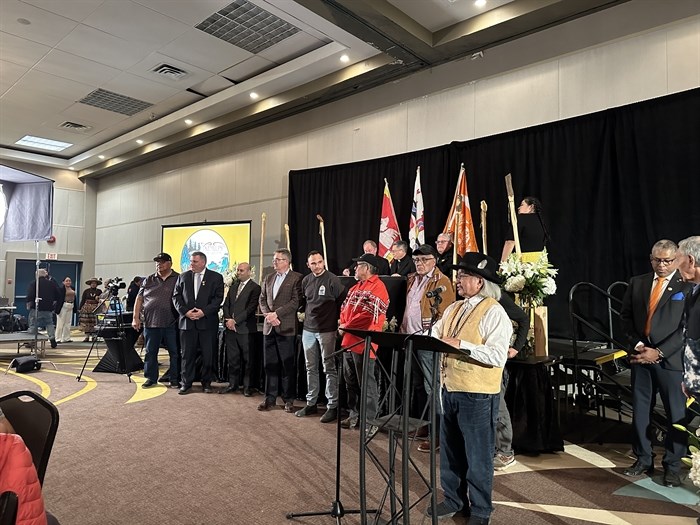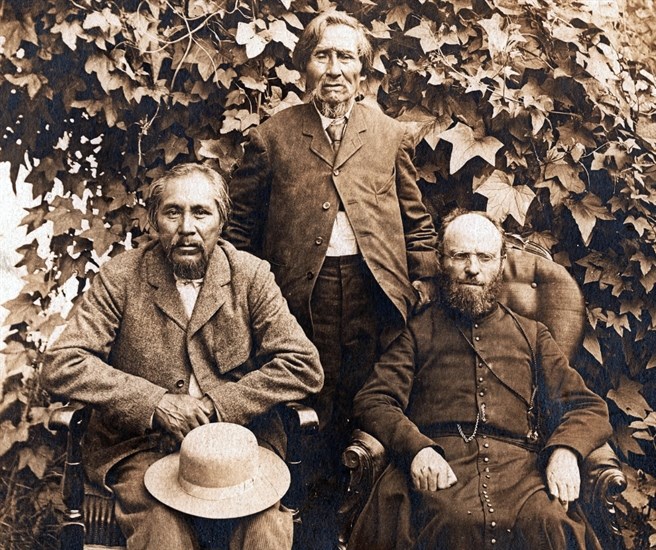
First Nation Kukpi7 Willie Sellars and Upper Nicola Band Chief Dan Manuel, as well as Member of Parliament Frank Caputo, Member of the BC Legislative Assembly Peter Milobar, and Kamloops City Councillor Bill Sarai witnessed the signing of the Sacred Covenant on March 31.
Image Credit: SUBMITTED/ Tk?emlúps te Secwépemc
April 01, 2024 - 4:40 PM
A historic ceremony between the Tk?emlúps te Secwépemc and the Roman Catholic Church took place on the weekend, marking a significant step toward healing and reconciliation.
The Roman Catholic archdiocese of Vancouver and the Roman Catholic diocese of Kamloops came together on the grounds of the former Kamloops Indian Residential School to sign a Sacred Covenant on Easter Sunday yesterday, March 31.
“As a first nation with staff that is dedicated to investigating the missing children from a former Roman Catholic residential school we have been dedicated to finding answers about the missing children from the Kamloops Indian residential school,” Casimir said at the opening of the ceremony. “From the earliest days of breaking news and preliminary findings in May of 2021 to today, we have been very clear that we required cooperation from the Roman Catholic Church, particularly when it comes to accessing historical records.”
In 2021, Casimir and the Secwepemc council passed a resolution to negotiate with the Roman Catholic Church for transparency and access to historical records following the discovery of a burial site with the remains of 215 children at the former Kamloops Indian Residential School.
In March, 2022 Casimir went to Rome and spoke with the Pope seeking access to archives and records, reconciliation and justice.
In his address on Easter Sunday, Vancouver archdiocese J. Michael Miller credited the unprecedented covenant in part to Casimir’s efforts in reaching out to the church.
“Kúkpi7 Rosanne has forthrightly and passionately articulated the need for the Catholic Church to be transparent, accountable and ready to listen and learn,” Miller said in a media release issued today, April 1. “We are here today as a sign of our willingness and our commitment to do just that.”
The archdiocese also credited the chiefs who came up with the idea for the covenant, former Chief Manny Jules and former Assembly of First Nations Chief Phil Fontaine who wanted to bridge the gap between First Nations and the Catholic Church.
“They saw the understandable wave of grief unleashed because of the reports out of Kamloops,” he said. “Together they made the hard decision to welcome Catholics into the healing journey that each Nation was navigating. For their openness to the Catholic Church in this matter, I am very grateful. Chief Manny Jules has often and wisely stated that ‘One cannot reconcile without the other.’”

This 1904 photograph is of Chief Louis Clexlixgen of Kamloops, Johnnie Chilleheetsa of Douglas Lake and Father Le Jeune, an Oblate priest.
Image Credit: SUBMITTED/ Tk?emlúps te Secwépemc
In his address, Miller expressed deep regret for the tragedies surrounding the residential school system. He repeated parts of his Expression of Apology and Hope he first delivered before a Truth and Reconciliation Commission meeting in Vancouver, 2013, where he acknowledged the archdiocese of Vancouver played a role in implementing a "deeply flawed policy’ which ‘led to unbearable pain and suffering’ and ‘in supporting a policy aimed at suppressing Aboriginal cultures and languages."
“Since then, having met with more survivors and heard even more first-hand accounts, I can state even more clearly just how aware the Church is of the damage done to former students and their families, and how destructive the system was to being able to maintain community,” Miller said. “While we cannot undo the past, as Catholics we can do more to show our respect and our desire to serve.”
Miller shared his perspectives on some of topics covered in the covenant, including the Doctrine of Discovery, a series of confusing and political documents written by Pope Alexander VI in the late 1400s that led some European explorers to damage the rights of First Nations populations around the world, including the establishment of residential schools.
Also in the covenant is a story showing a good interaction between First Nations and the church, which is captured in a 1904 photograph of Chief Louis Clexlixgen of Kamloops, Johnnie Chilleheetsa of Douglas Lake and Father Le Jeune, an Oblate priest. The trio travelled to Rome to meet the Pope.
“There they advocated for the rights and title of First Nations people in this region, and they showed how their work together had advanced language and trade,” Miller said. “While in Rome, Chief Johnnie and Chief Louis took part in an exhibition of stenography, at which they received three gold and five silver medals.”
READ MORE: Why foster parenting is no easy task, a Kamloops foster parent's account
Miller said he found the friendship between the men profound and the photographer conveys respect and determination, equality and friendship.
The archdiocese listed many commitments of the church that are written in the covenant. These included helping to memorialize former students of the residential school system, providing researchers and historians to help create easier search tools for historical information, and providing scientific experts to provide technology to help First Nations get answers to their questions.
“We respect that you have so much work to do within your communities to comfort Elders and must decide prudently when and how to proceed,” Miller said. “We stand ready to follow your lead.”
Miller noted the difference between a contract and a covenant, where the former is a transaction, while the latter is relational in nature that involves a commitment to a way of caring and communicating.
“In our case, the Sacred Covenant involves the honouring of your ancestors and the children who died or endured great suffering during their time in a Residential School. On behalf of the Catholics whom Bishop Joseph and I represent, I pledge that we intend to continue to learn from you, to listen to your experiences and to find new ways that can serve you and advocate for your interests.”
READ MORE: Okanagan Lake's historic Fintry Queen is for sale
Miller delivered a message from Pope Francis:
"In light of the sufferings past, his holiness hopes that this generous gesture will be a further step on the path towards truth and reconciliation. Indeed, today’s gathering responds to the call of Pope Francis during his apostolic journey, when he spoke of the need for the church and the indigenous people of Canada to walk together, pray together and work together (meeting with Indigenous peoples, First Nations, Metis and Inuit, 25 July 2022). Upon the organizers and all taking part in this event, the holy father willingly invokes the abundant blessings of almighty God."
First Nation Kukpi7 Willie Sellars and Upper Nicola Band Chief Dan Manuel, as well as Member of Parliament Frank Caputo, Member of the BC Legislative Assembly Peter Milobar, and Kamloops City Councillor Bill Sarai witnessed the signing of the Sacred Covenant.
“To sign a sacred covenant with the Roman Catholic archdiocese of Vancouver is to enact important steps of contrition, be it confirming historical records, sharing truths and commitments to action, to sign it on Easter Sunday is a symbolic and significant step forward,” Casimir said.
To contact a reporter for this story, email Shannon Ainslie or call 250-819-6089 or email the editor. You can also submit photos, videos or news tips to the newsroom and be entered to win a monthly prize draw.
We welcome your comments and opinions on our stories but play nice. We won't censor or delete comments unless they contain off-topic statements or links, unnecessary vulgarity, false facts, spam or obviously fake profiles. If you have any concerns about what you see in comments, email the editor in the link above. SUBSCRIBE to our awesome newsletter here.
News from © iNFOnews, 2024